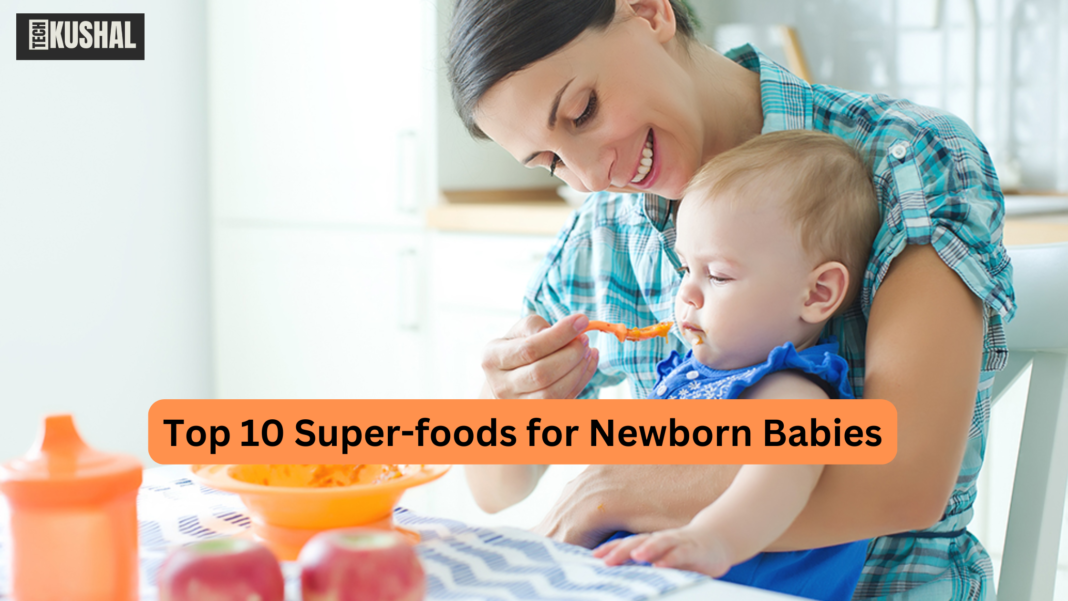
Top 10 Super-foods for Newborn Babies, the first few months of a newborn’s life are crucial for their growth and development. Nutrition plays a pivotal role during this period, and while breast milk or formula is the primary source of nourishment for the first six months, introducing solid foods at the appropriate time is essential for meeting the growing nutritional needs of the baby. The term “superfoods” refers to foods that are exceptionally rich in nutrients and provide numerous health benefits. Here, we explore the top 10 superfoods that can be introduced to newborn babies as they start transitioning to solid foods.
Read More: Top 5 Laptops for Engineers: The Ultimate Guide
1. Breast Milk

Though not a solid food, breast milk deserves the top spot as the ultimate superfood for newborns. It is packed with all the essential nutrients, antibodies, and enzymes required for a baby’s healthy development. The World Health Organization (WHO) recommends exclusive breastfeeding for the first six months of life. Breast milk is easily digestible, promotes a strong immune system, and fosters a deep bond between mother and child.
2. Avocado
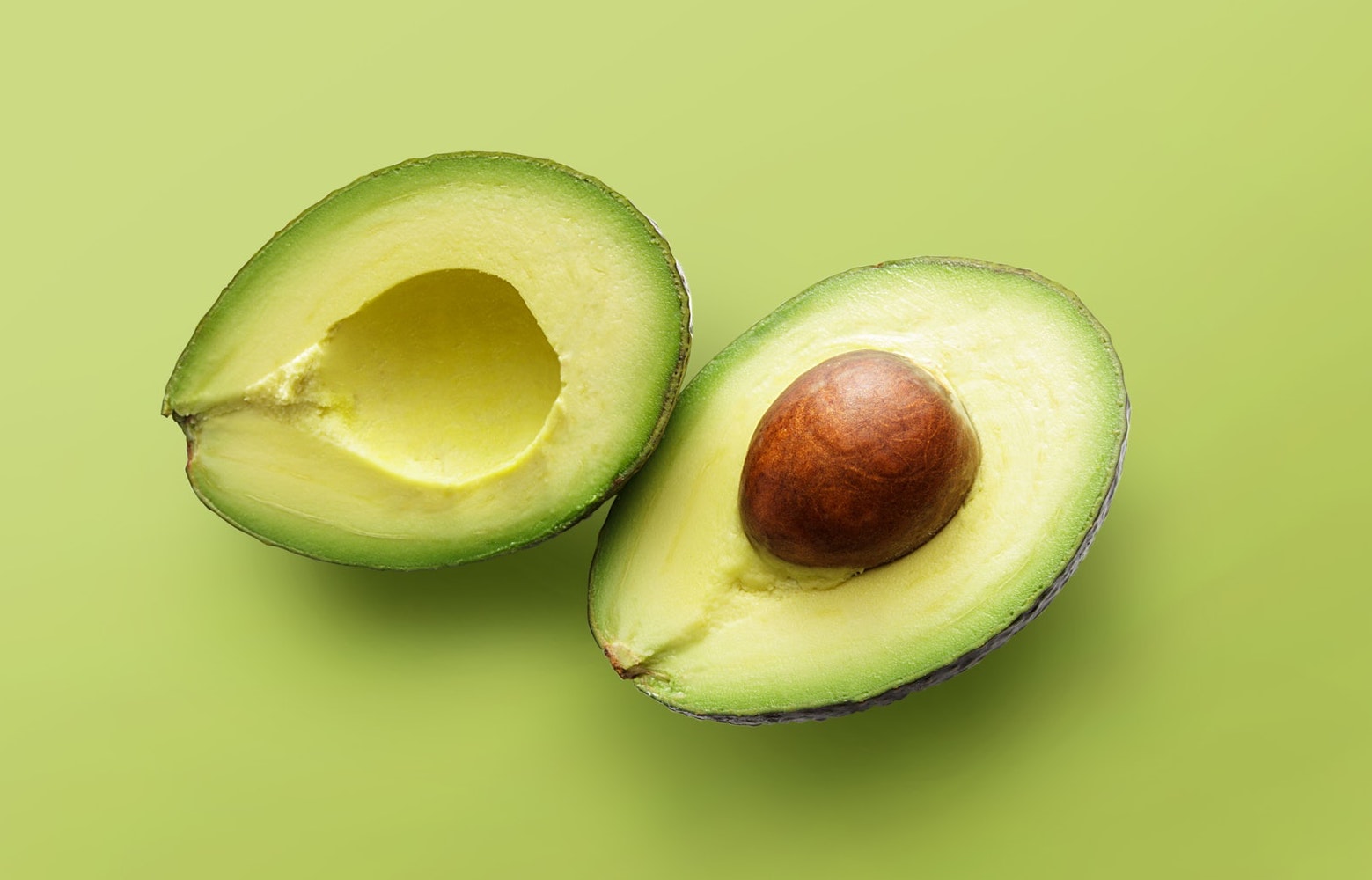
Avocado is often considered one of the best first foods for babies. It is rich in healthy fats, particularly monounsaturated fats, which are vital for brain development. Avocados also provide fiber, vitamins like vitamin E and K, and minerals such as potassium and folate. The creamy texture of avocado makes it easy for babies to eat, and its mild flavor is generally well-tolerated by infants.
Nutritional Benefits:
- Supports brain development with healthy fats.
- Promotes heart health and overall growth.
- Provides essential vitamins and minerals.
3. Sweet Potatoes

Sweet potatoes are another excellent choice for babies starting on solids. They are rich in beta-carotene, which the body converts into vitamin A, essential for eye health, skin, and immune function. Sweet potatoes also offer dietary fiber, vitamins C and B6, and potassium. Their natural sweetness and soft texture make them appealing to babies.
Nutritional Benefits:
- Supports vision and immune health.
- Provides energy through complex carbohydrates.
- Easy to digest and gentle on the stomach.
4. Bananas
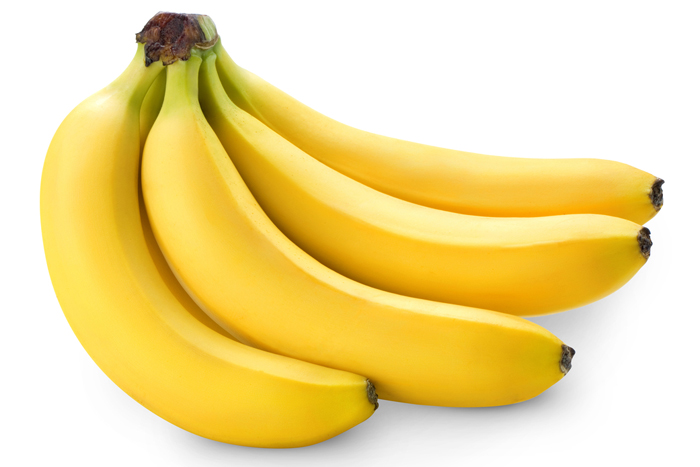
Bananas are often referred to as a perfect food for babies due to their portability, ease of preparation, and nutritional value. They are rich in potassium, which is crucial for heart health and muscle function, and they also provide vitamins B6 and C. Bananas are gentle on the stomach, making them an excellent choice for a baby’s first food.
Nutritional Benefits:
- Promotes healthy digestion.
- Provides a quick source of energy.
- Helps maintain proper muscle and nerve function.
5. Oatmeal

Oatmeal is a nutrient-dense grain that is easy to digest and versatile. It is a great source of iron, which is important for preventing anemia, as well as fiber, protein, and B vitamins. Oatmeal can be easily mixed with breast milk, formula, or water to create a smooth texture suitable for babies.
Nutritional Benefits:
- Supports healthy growth and development.
- Promotes digestive health with fiber.
- Provides long-lasting energy.
6. Carrots
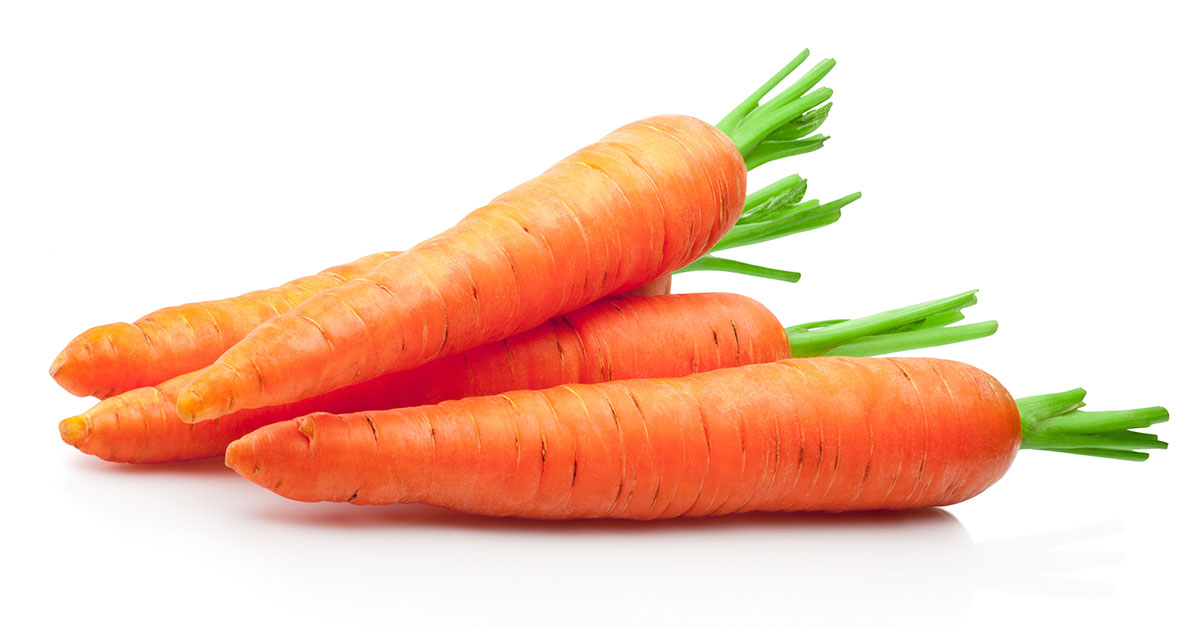
Carrots are rich in beta-carotene, which promotes healthy vision and immune function. When cooked and pureed, carrots have a naturally sweet flavor that babies tend to enjoy. They are also a good source of dietary fiber, vitamin K, and potassium.
Nutritional Benefits:
- Supports eye health and immune function.
- Provides a natural sweetness that babies love.
- Easy to digest and promotes healthy bowel movements.
7. Blueberries
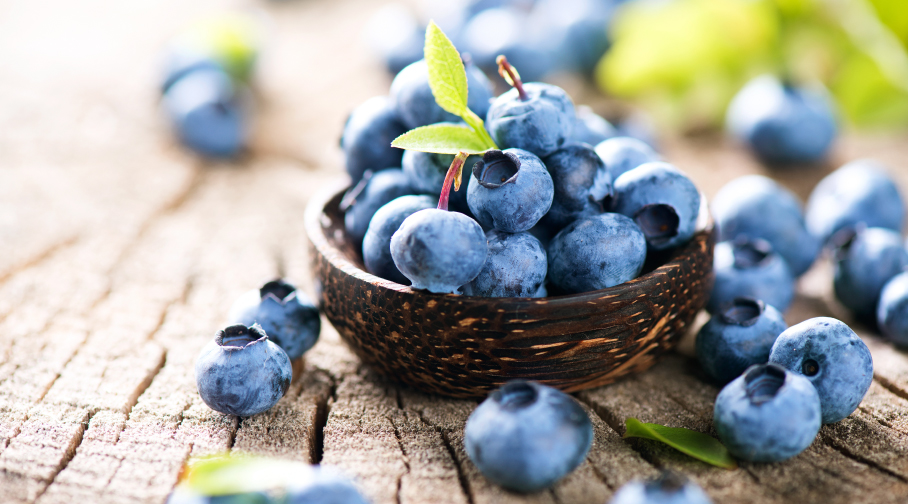
Blueberries are often hailed as a superfood for their high antioxidant content. These tiny berries are packed with vitamins C and K, fiber, and manganese. The antioxidants in blueberries help protect the baby’s cells from damage, and they are also known to support brain health.
Nutritional Benefits:
- Provides antioxidants that protect cells.
- Supports brain development and function.
- Boosts immune system with vitamin C.
8. Butternut Squash

Butternut squash is a nutrient-rich vegetable that is easy to prepare and digest. It is high in beta-carotene, which is essential for vision and immune health, and also provides fiber, vitamin C, and potassium. The natural sweetness of butternut squash makes it an appealing first food for babies.
Nutritional Benefits:
- Supports healthy vision and immune function.
- Provides essential vitamins and minerals.
- Soft texture and sweet flavor are ideal for babies.
9. Egg Yolk

Egg yolk is an excellent source of essential nutrients such as choline, which is vital for brain development, and vitamin D, which supports bone health. It also provides healthy fats, protein, and iron. While whole eggs are a common allergen, introducing egg yolk alone after consulting with a pediatrician can be beneficial for your baby.
Nutritional Benefits:
- Supports brain development with choline.
- Provides essential vitamins and healthy fats.
- A good source of iron and protein.
10. Yogurt

Yogurt is an excellent source of calcium, protein, and probiotics, which support digestive health. When choosing yogurt for your baby, opt for plain, full-fat varieties without added sugar. The probiotics in yogurt help maintain a healthy gut, and calcium is essential for strong bones and teeth.
Nutritional Benefits:
- Supports bone health with calcium.
- Provides probiotics for a healthy digestive system.
- Offers protein for growth and development.
Tips for Introducing Superfoods to Your Baby
- Start Slowly: Introduce one new food at a time, waiting 3-5 days before adding another to monitor for any allergic reactions.
- Texture Matters: Begin with pureed or mashed versions of these superfoods to make them easy for your baby to swallow.
- Variety is Key: Offer a wide range of foods to ensure your baby gets a variety of nutrients and develops a taste for different flavors.
- Consult Your Pediatrician: Before introducing any new foods, especially potential allergens like egg yolk, consult your baby’s doctor to ensure it’s safe.
- Observe and Adapt: Pay attention to your baby’s reactions to different foods and adjust the diet accordingly.
Case Study: Introducing Superfoods to Baby Emma
Background: Emma was born a healthy baby girl, weighing 7 pounds 2 ounces. Her parents, Sarah and John, were determined to provide her with the best possible nutrition to ensure optimal growth and development. Emma was exclusively breastfed for the first six months, as recommended by her pediatrician. As Emma approached the six-month mark, Sarah and John began researching the best foods to introduce as Emma transitioned to solids. They were particularly interested in nutrient-dense superfoods that would support Emma’s developing body and brain.
Objective: The primary goal for Sarah and John was to introduce a variety of superfoods to Emma’s diet in a safe and systematic manner, ensuring she received the essential nutrients needed for her growth while monitoring for any potential food allergies or intolerances.
Methodology:
- Consultation with Pediatrician: Sarah and John scheduled a consultation with Emma’s pediatrician to discuss the introduction of solid foods. The pediatrician provided guidelines on starting with single-ingredient foods, waiting a few days between introducing new foods, and being aware of potential allergens. They were also advised to focus on foods that provide a good balance of vitamins, minerals, and healthy fats.
- Selection of Superfoods: Based on their research and the pediatrician’s recommendations, Sarah and John decided to introduce the following superfoods to Emma’s diet:
- Avocado
- Sweet Potatoes
- Bananas
- Oatmeal
- Carrots
- Blueberries
- Butternut Squash
- Egg Yolk
- Yogurt
They also continued breastfeeding, recognizing that breast milk would remain an important source of nutrition.
- Introduction Plan: Sarah and John created a schedule to introduce each superfood one at a time, starting with avocado due to its healthy fats and creamy texture. They planned to introduce a new food every four days to monitor Emma’s reactions and ensure she was not allergic to any new foods.
- Preparation of Foods: To make the foods easy for Emma to eat, Sarah and John prepared each superfood in a way that was suitable for her age:
- Avocado: Mashed to a smooth consistency.
- Sweet Potatoes: Steamed and pureed.
- Bananas: Mashed until smooth.
- Oatmeal: Cooked with water and blended to a thin, smooth texture.
- Carrots: Steamed and pureed.
- Blueberries: Pureed and mixed with other foods like oatmeal.
- Butternut Squash: Roasted and pureed.
- Egg Yolk: Hard-boiled, mashed, and mixed with a small amount of breast milk.
- Yogurt: Plain, full-fat yogurt served as is.
- Monitoring and Adaptation: Sarah and John kept a food diary to track the foods Emma ate and her reactions, including any signs of allergies or digestive issues. They also noted her preferences, which would help them plan future meals.
Implementation:
- Week 1: Emma’s first food was mashed avocado. Sarah and John were thrilled to see that Emma enjoyed the creamy texture, and there were no signs of an allergic reaction. They continued giving her avocado for four days before introducing the next food.
- Week 2: Sweet potatoes were introduced next. Emma seemed to love the natural sweetness of the sweet potatoes, and the transition was smooth. Emma’s pediatrician confirmed that sweet potatoes were an excellent source of beta-carotene, which would support her eye health.
- Week 3: The introduction of bananas was a hit. Emma loved the taste and texture, and her parents appreciated how easy bananas were to prepare. Sarah and John were also pleased to know that bananas provided potassium, which is vital for heart health.
- Week 4: Oatmeal became a staple in Emma’s diet. They mixed it with breast milk to make it smoother and more palatable. Oatmeal provided a good source of iron, which was important for preventing anemia as Emma’s iron stores from birth began to decrease.
- Week 5: Carrots were introduced, adding another colorful vegetable to Emma’s diet. The natural sweetness and vibrant orange color made carrots an appealing choice, and the beta-carotene was beneficial for Emma’s developing eyesight.
- Week 6: Blueberries were introduced as a new flavor experience for Emma. Blended into a puree, blueberries provided antioxidants to support Emma’s immune system and brain development. The deep color and slightly tangy taste were a new and exciting experience for Emma.
- Week 7: Butternut squash was another sweet and nutritious addition. Sarah and John noticed that Emma enjoyed the soft texture and sweetness, similar to sweet potatoes. They were happy to provide another source of beta-carotene and vitamin C.
- Week 8: Introducing egg yolk required careful monitoring due to the potential for allergies. Sarah and John mashed the hard-boiled egg yolk and mixed it with breast milk to create a smooth texture. Emma tolerated the egg yolk well, and the choline in the yolk was noted as beneficial for her brain development.
- Week 9: Finally, plain yogurt was introduced. Sarah and John selected a full-fat yogurt with live probiotics to support Emma’s digestive health. Emma enjoyed the creamy texture, and the yogurt became a regular part of her diet.
Outcomes:
By the time Emma reached eight months old, she had been successfully introduced to all the selected superfoods. She showed no signs of allergies, and her growth was on track according to her pediatrician’s checkups. Sarah and John observed that Emma enjoyed a variety of flavors and textures, which they believed would help her develop a broad palate as she grew.
The introduction of these superfoods provided Emma with a strong nutritional foundation. Each food contributed to different aspects of her development, from brain health and immune support to bone strength and digestive health. Sarah and John were pleased with the process and felt confident in continuing to explore new foods as Emma grew older.
Conclusion
Introducing superfoods to your newborn baby is a great way to ensure they receive the essential nutrients needed for optimal growth and development. Each of these top 10 superfoods offers unique benefits that support different aspects of your baby’s health, from brain development to digestive health. Remember, the journey to solid foods should be gradual, with careful attention to your baby’s needs and preferences. By providing a balanced diet rich in these nutrient-dense foods, you’re laying the foundation for a lifetime of healthy eating habits.
This case study demonstrates the importance of carefully selecting and introducing nutrient-dense superfoods during the critical early months of a baby’s life. By taking a gradual and systematic approach, Sarah and John were able to provide Emma with a balanced and diverse diet, ensuring she received the essential nutrients needed for her development. Their experience highlights the value of planning, consultation with healthcare providers, and attentiveness to a baby’s individual needs during the transition to solid foods.
